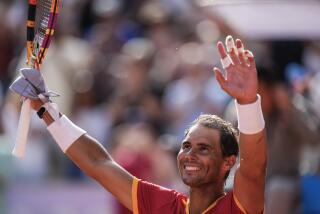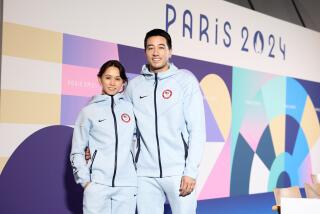French final is family matter
- Share via
I held my father’s hand and whispered in his ear.
“The final is on,” I said. “And Federer is playing great.”
When there was no response, when he did not smile, when his eyes did not focus on the small television near his narrow hospice bed, I knew our time was running out.
Three years later, that final, the men’s French Open final, will today be played again. Roger Federer will try for a record-tying 14th Grand Slam win. But as has been the case for every final since 2006, I’m not sure how much I will watch. The last match played on the fickle and tempestuous clay in Paris now brings me too many memories of a fateful day.
In many ways, my dad and I were more like brothers than father and son. Born in 1931, Mel Streeter grew up in Riverside, where he starred as a tall, slashing forward on the Riverside Poly basketball team and was recognized as one of the best high school athletes in Southern California. In 1950, he went north, to the University of Oregon, becoming arguably the first black player to star on the basketball team.
As proud as I am of those accomplishments, I’m more proud of what happened after basketball. In 1954, when the country was a deeply fractured place, my dad had courage enough to marry my mom, the white daughter of Astoria, Oregon’s superintendent of schools. Together, despite all odds, they had four boys, me the last, and a sometimes turbulent relationship that included a divorce and remarriage.
As I grew up, my father gave me a great gift: tennis. He’d taught himself the game, starting in Riverside in the 1940s, refusing to listen to those who said the game was not for someone who looked like him. He loved tennis like no one I’ve ever met. When basketball was over, he turned himself into a skilled player.
My parents divorced when I was 9. My dad lived in another part of Seattle. We could have grown apart. Instead, by teaching me the game, by spending hour after countless hour on the court with me -- sacrificing time, money and sweat, enduring our spats and my insolent teen defiance -- he forged a bond that will never break.
I was never truly great. But I was always pretty good. Good enough to be ranked in the Division I college top 50 and play in the low-level pros. A highlight came in 1983, when my dad and I represented the Northwest at a father-son doubles tournament played in New York, in conjunction with the U.S. Open.
Tennis’ Grand Slam events took on extra significance after that tournament. After quitting tennis at 25, I lost touch with the game. But every time one of the Slams rolled around we’d be on the phone, my dad urging me back. “You should see how well Edberg’s moving,” he’d say. “Kurt, Sampras is going to win this thing. . . . Kurt, you gotta watch this Serena kid play.”
In 2004, a Grand Slam tournament played an unforgiving role in our relationship.
That year, I met my dad and brother Jon in New York for the U.S. Open. It was supposed to be a celebration. Instead, it was the trip where I had to confront the truth: Illness was swooping down on a man who’d lived his whole life healthy. Suddenly, he was tired and slow and weak and confused.
We soon found out he had amyloidosis, a rare genetic disease that causes proteins in the body to go haywire. In my dad’s case, the proteins laid waste to his heart, lungs and brain, mimicking Alzheimer’s.
By May 2006, I was flying home to Seattle twice a month. There was suffering and morphine and confusion. As he would have done for me, I devoted my life to helping my father end his with as much grace as could be summoned.
The French Open helped. We watched most of the tournament play out on a little TV that sat near the bed in my parents’ home. During the early rounds, I held his big hands, massaged his wide shoulders and propped him up on pillows as we tuned in. It was a respite, one last good thing.
But by the time the quarterfinals came, his breathing was growing desperate. It wasn’t long before my family was forced to move him to a hospice.
There, in a beige-walled room he shared with another dying man, the French remained a touchstone. We’d surrounded him with mementos: photos of my brothers, newspaper clippings hailing the architecture firm he’d built and the trail he and my mother had blazed.
He looked right past all of this when the tennis was on.
“Federer,” he’d say, smiling wistfully, moving an arm in the sweeping motion of a backhand. “The guy is so good.”
He couldn’t wait to watch the final.
The night before that last match, I slept in another room, needing to catch my bearings.
When I woke, the match was underway, Federer ahead of Rafael Nadal early. I came to his room. “Wake up, Dad, the final is on.”
He didn’t respond. His eyes didn’t flash. There was no smile, only a peaceful look on his dignified face. Right then I knew our march together was almost over. Knew everything he’d always tried to teach me and my brothers -- perseverance, empathy, guts -- I’d from now on have to keep alive on my own. Right then, it was clear I would never watch a French Open final the same way again.
As it happened, Nadal roared back, winning his second French title. But by the time the last ball had been struck, my dad’s eyes had been closed for a long while. He did not, so far as I know, open them again until the next day, the day he died, when his eyes focused briefly on his family one last time.
--
More to Read
Go beyond the scoreboard
Get the latest on L.A.'s teams in the daily Sports Report newsletter.
You may occasionally receive promotional content from the Los Angeles Times.











